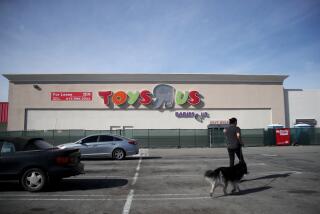Kinder Morgan to Go Private in Buyout
- Share via
When Richard Kinder left Enron Corp. 10 years ago, he walked away with a pipeline business that didn’t fit into the booming company’s vision for building the energy trader of the future.
On Monday, the company Kinder and his partners built from Enron’s castoffs said it would go private in a buyout valued at $14.6 billion.
If approved by shareholders, the acquisition of Houston-based Kinder Morgan Inc. by an investment group led by Kinder and other senior executives would be the third-biggest leveraged buyout ever. It also would bring Kinder, an executive admired for his $1 annual salary and perceived dedication to shareholders, a hefty paper gain on his company stock holdings.
The investment group is buying Kinder Morgan for $107.50 a share in cash. The group initially offered $100 a share in late May, but sweetened its bid after several shareholder lawsuits were filed seeking a higher price. The buyers also would assume $7 billion in debt for a total transaction value of just under $22 billion.
“They’re paying a pretty good premium over where the company’s stock has been trading, and that’s a good thing for shareholders,” said Houston energy consultant Andrew Lipow.
The deal is expected to close early next year.
Kinder Morgan operates a 43,000-mile North American pipeline system that transports natural gas, crude oil and petroleum products. It also owns extensive storage facilities and serves retail natural gas customers in the Chicago area and parts of Colorado, Wyoming and Nebraska.
The company also is the general partner of Kinder Morgan Energy Partners, a publicly traded pipeline company with large holdings in California that have been plagued with problems. Kinder Morgan Inc. owns a 13% stake in the energy partnership and the two companies share senior management teams.
Richard Kinder was Enron’s president and chief operating officer when he left in 1996 after Chairman and Chief Executive Kenneth L. Lay declined to give Kinder the CEO job. The next year, Kinder paid $40 million for Enron’s liquids pipelines.
While his former employer slid into bankruptcy and an accounting scandal, Kinder and partner William Morgan, a fellow University of Missouri alumnus, built their modest pipeline operator into an industry powerhouse with 8,300 employees. Last year, Kinder Morgan earned $554 million, an increase of about $30 million from 2004.
Along the way, Kinder picked up accolades for his modest management style, which included flying coach, serving barbecue and beer at get-togethers with Wall Street analysts and taking an annual salary of 93 cents after taxes with no stock options or restricted stock.
Not that Kinder is hurting. His approximately 18% stake in Kinder Morgan is worth $2.58 billion at the sweetened price. The company’s stock rose $2.57 on Monday to $104.27, bringing the paper gain on Kinder’s personal holdings to around $476 million since the investment group first proposed taking Kinder Morgan private three months ago.
Investment tracker Morningstar Inc. named Kinder its chief executive of the year for 2005, noting that his company returned almost 30% a year on average to its shareholders over the last decade.
The company said Monday that Kinder would remain chairman and CEO after the buyout and reinvest his 24 million shares in the company.
The Kinder Morgan transaction comes during what is shaping up to be a record year for mergers and acquisitions. By late July, the global value of such deals had risen to $2.18 trillion, ahead of the pace set in 2000 at the height of the Internet boom.
Much of that activity has been in the energy sector, where rising prices have spurred competitors and investors to snap up oil and gas companies. On Monday, Western Refining Inc. said it was buying Giant Industries Inc. for $1.23 billion, creating the fourth-largest publicly traded independent oil refiner in the U.S.
Analysts said concerns that some investors might be buying at the top of the market shouldn’t apply in the case of Kinder Morgan, which makes most of its money from transporting energy products rather than producing and selling them.
“They don’t make their money off commodity prices as much as commodity volumes and that’s something that’s going to continue to grow,” said Robert Lane, an analyst at Sanders Morris Harris Group in Houston.
Other members of the investment group include insurer American International Group Inc., investment bank Goldman Sachs Group Inc. and investment firms Carlyle and Riverstone Holdings.
One analyst said the buyout could catch the attention of regulators because Goldman Sachs, Carlyle and Riverstone have already made substantial investments in refiners, pipeline companies and storage terminal operators.
“The deal is likely to draw Federal Trade Commission scrutiny,” Tom Kloza, publisher and chief oil analyst at Oil Price Information Service, wrote in a report to clients. “The FTC has been more vigilant in the pipeline and terminal sector, ordering more divestitures there than in refining or retailing.”
In addition, credit analysts at Standard & Poor’s Corp. said the large increase in debt needed to finance the buyout probably would bring a downgrade of the company’s BBB credit rating.
Although Kinder Morgan Energy Partners isn’t directly involved in the buyout and will remain a publicly traded company, it is on S&P;’s CreditWatch with negative implications “because of its business and financial ties” to its general partner.
Kinder Morgan Energy Partners is the nation’s largest operator of petroleum product pipelines, transporting 2 million barrels a day of gasoline, jet fuel, diesel and natural gas liquids through more than 10,000 miles of pipes.
About 3,200 miles of those are in the partnership’s Pacific division, mostly in California. The company operates major storage terminals in the Bay Area and near the Los Angeles port, and runs pipelines from those locales to San Diego, Las Vegas and Reno, Nev., and into Arizona.
The energy partnership has had a multi-year string of accidents involving its California operations, including a 2004 incident that killed five men when a backhoe punctured an unmarked Kinder Morgan pipeline. The company was fined $640,000 by state regulators, who are conducting a criminal probe.
In April 2005, the company pleaded guilty to criminal charges related to a pipeline rupture that spilled 103,000 gallons of diesel fuel into a Bay Area marsh.
Kinder Morgan, which plans to spend $90 million on maintenance and safety upgrades, was fined $5 million and placed on three year’s probation.
More to Read
Inside the business of entertainment
The Wide Shot brings you news, analysis and insights on everything from streaming wars to production — and what it all means for the future.
You may occasionally receive promotional content from the Los Angeles Times.










